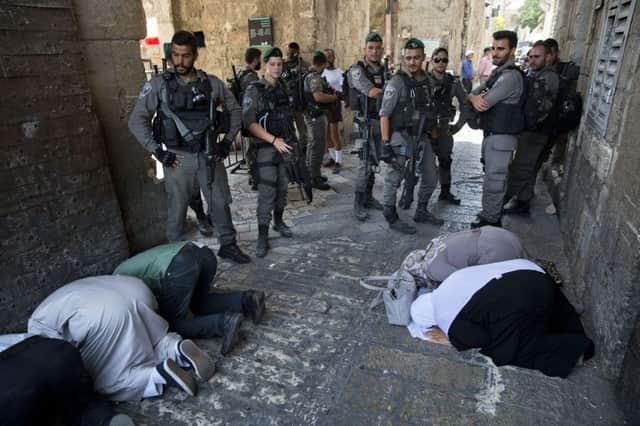Metal detectors at Jerusalem shrine removed amid tension


The pre-dawn operation outside the Al-Aqsa Mosque compound came after the Israeli security cabinet met for a second day to find an alternative to the metal detectors, installed after a deadly Palestinian attack at the holy site in Jerusalem’s Old City.
Jews call the site the Temple Mount and Muslims refer to it as Haram al-Sharif.
Advertisement
Hide AdAdvertisement
Hide Ad“The security cabinet accepted the recommendation of all of the security bodies to incorporate security measures based on advanced technologies (smart checks) and other measures instead of metal detectors,” Israel announced early yesterday.
It said the measure would “ensure the security of visitors and worshippers” at the holy site and in Jerusalem’s Old City and the police presence would increase in the area until the new security measures were in place.
Israeli media reported that high resolution cameras capable of detecting hidden objects would be deployed.
Israel installed the metal detectors after Arab gunmen killed two policemen from inside the shrine, holy to Muslims and Jews, earlier this month.
The move enraged the Muslim world and triggered violence.
The fate of the site is an emotional issue at the heart of the conflict between Israel and the Palestinians, with even the smallest perceived change to delicate arrangements sparking tension.
Just a few hours earlier, Israel and Jordan resolved a diplomatic stand-off late after a day of top-level negotiations that ended with the evacuation of Israeli embassy staff from their base in Jordan.
The crisis was triggered by a shooting on Sunday in which an Israeli embassy guard killed two Jordanians after one attacked him with a screwdriver.
Jordan said initially that the guard could leave only after an investigation, while Israel said he enjoyed diplomatic immunity.
Advertisement
Hide AdAdvertisement
Hide AdThe crisis was resolved after a phone call late on Monday between Israeli prime minister Benjamin Netanyahu and Jordan’s King Abdullah.
The relatively swift end to the stand-off signalled progress towards ending the crisis over the contested shrine.
Jordan is the Muslim custodian of the site which is also holy to Jews.
Israel’s security cabinet spent Monday trying to find an alternative to the metal detectors with ministers asked to consider sophisticated, high-resolution cameras and more police as a replacement, Israeli news reports said.
The reports had said the emerging deal could see the embassy security guard released in exchange for the removal of the metal detectors.
The 37-acre walled compound in Jerusalem is the third holiest site of Islam, after Mecca and Medina in Saudi Arabia.
It is also the holiest site of Judaism, revered as the place where biblical temples once stood.
Mr Netanyahu and King Abdullah discussed the shrine in their phone call, Jordan’s state news agency Petra said.
Advertisement
Hide AdAdvertisement
Hide AdThe king stressed the need to “remove the measures taken by the Israeli side since the recent crisis broke out” and to agree on steps that would prevent another escalation in the future, Petra said.
Earlier, the head of Israel’s domestic Shin Bet security agency met officials in Jordan to resolve the crisis, the worst between the two countries in recent years.
Jordan and Israel have a peace agreement and share security interests, but frequently disagree over policies at the shrine.